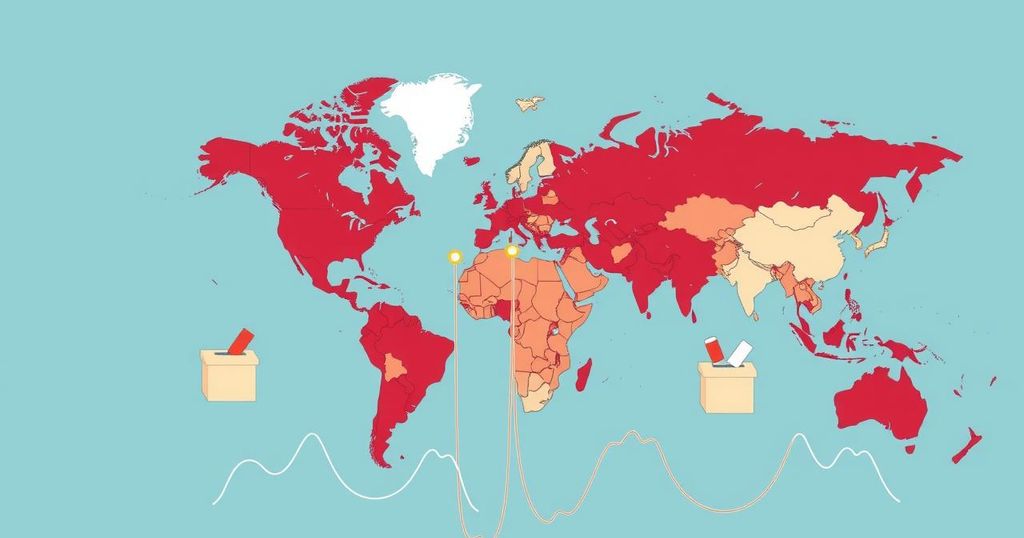Global Elections of 2024: Transformations and Challenges for Democracy

The year 2024 witnessed extraordinary global electoral activity with around 4 billion voters participating. Key developments included the political comeback of Donald Trump in the U.S., a coalition government in India, and significant electoral changes in Europe and Latin America, all of which have far-reaching implications for international geopolitics.
In 2024, approximately 4 billion individuals participated in elections worldwide, highlighting a notable period of democratic engagement. Several nations experienced political shifts: India’s ruling party faced challenges, South Africa’s ANC lost its parliamentary majority, and European countries witnessed the rise of far-right factions alongside governmental collapses in key economies such as France and Germany. Notably, Donald Trump made a significant political comeback in the United States, marking a pivotal year for international geopolitics.
The United States experienced a dramatic political shift with Donald Trump’s reelection on November 5, showcasing not only his influence over a resurgent Republican Party but also their appeal to previously Democratic-leaning non-college-educated voters. Trump’s campaign capitalized on economic discontent and anti-immigration sentiments, resulting in a decisive victory that restored Republican control over both houses of Congress, potentially facilitating the implementation of his policies.
In Asia, Indian Prime Minister Narendra Modi’s Hindu nationalist party faced unexpected opposition in the general elections, leading to the formation of a coalition government. This political change raises questions about Modi’s ability to push through contentious reforms while maintaining India’s independent foreign policy. In Indonesia, Prabowo Subianto’s election, marred by allegations of irregularities, could tilt the balance of power toward China, challenging the incoming Trump administration’s strategy in the Pacific.
Europe’s political landscape was tumultuous, especially in France, where President Emmanuel Macron’s snap election resulted in a divided parliament, stalling governance amid escalating national debt. Conversely, the United Kingdom witnessed a change in leadership with the Labour Party’s victory after 14 years of Conservative rule, although public approval of new Prime Minister Keir Starmer remains low amid continuing societal challenges.
Latin America also experienced significant elections, particularly in Mexico, where Claudia Sheinbaum’s rise as the country’s first female and first Jewish president indicates a potential continuation of leftist policies amid criticisms of judicial reforms. Meanwhile, Venezuela’s elections were marred by accusations of unfair practices, with incumbent Nicolás Maduro maintaining his grip on power despite widespread protests.
Lastly, South Africa’s African National Congress party suffered a historic loss, necessitating a coalition government amid ongoing economic challenges. Despite some recent improvements in economic stability, substantial issues such as poverty and unemployment persist, manifesting the complex nature of South African democracy. In essence, the elections of 2024 have far-reaching implications, shaping the political landscape across continents and influencing global alliances for years to come.
The year 2024 marked a pivotal moment for democracies around the world as nations prepared for pivotal elections that would set the course for their political and social futures. The participation of approximately half the global population in these elections underscored the significance of current electoral processes in influencing international relations and governance. Political turbulence characterized many nations, as voter sentiments shifted in response to local challenges, leadership controversies, and global crises, such as economic hardship and social unrest.
In conclusion, the democratic events of 2024 have unveiled a myriad of complex political dynamics that could shape international relations for the foreseeable future. Significant elections across continents reflect emerging patterns of governance, with implications for cooperation and conflict on a global scale. As political landscapes evolve, maintaining democratic integrity and addressing societal challenges remain critical for nations worldwide.
Original Source: www.semafor.com







